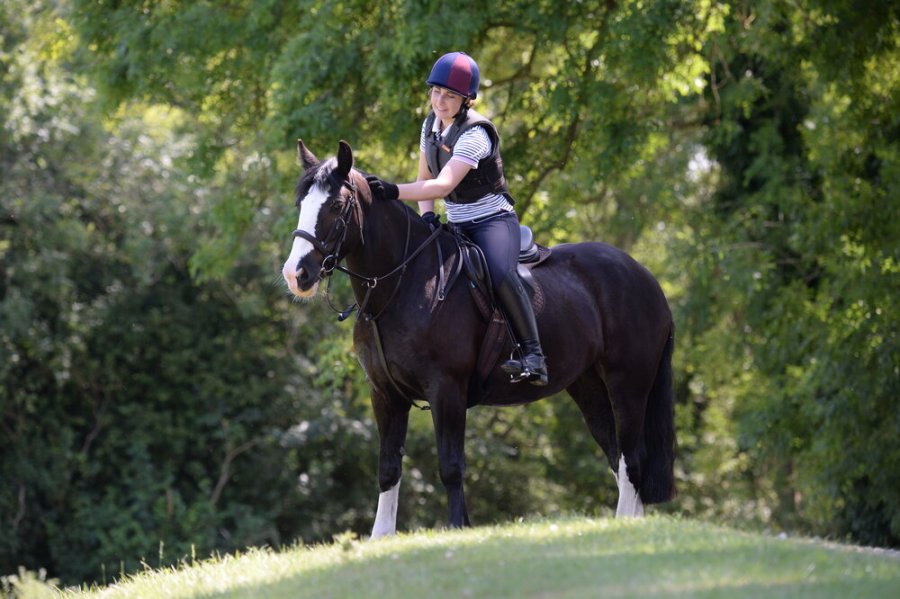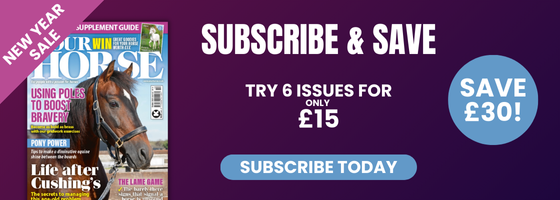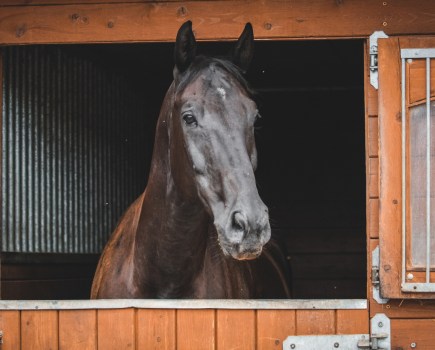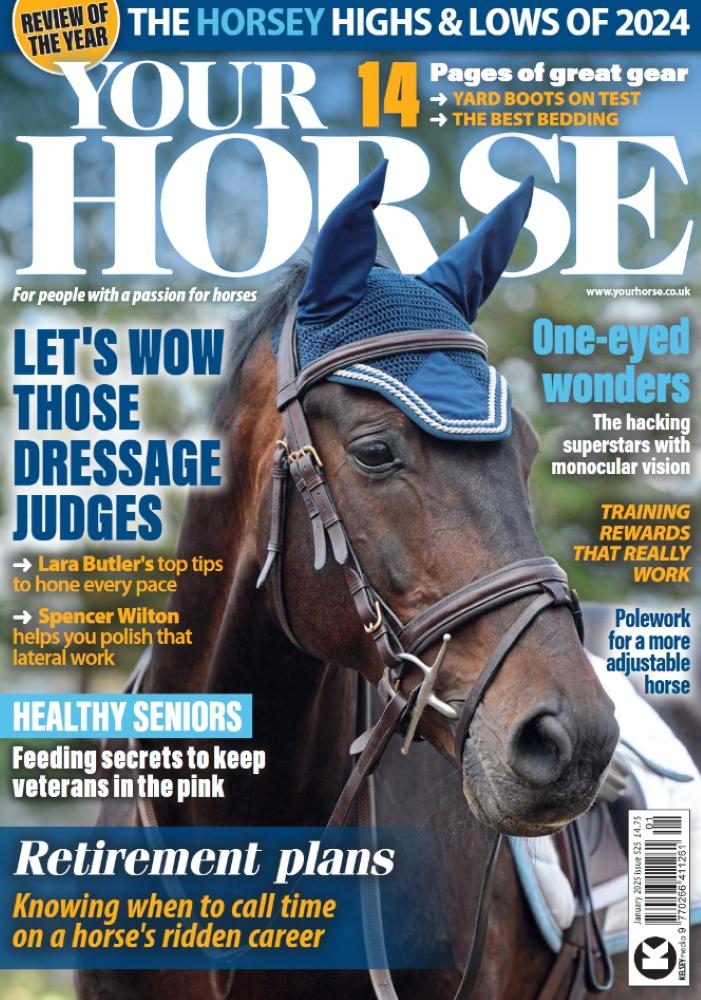Have you ever thought about what happens in your body when you or your horse are afraid? Whenever you are scared — and not only when you might be feeling fear while riding a horse — your body is given the ‘danger’ signal by your nervous system. Information travels from your senses to your brain via your nervous system, which then floods your body with adrenalin and cortisol, giving the alarm signal to react. You react in one of three ways: fight, flight or freeze.
The same process happens in your horse when they are afraid, but the locomotion part of their brain is much larger than ours, so they are hot-wired to run away from danger, whereas we are more likely to bottle it up and carry on as normal. Horse are very good at managing adrenalin. They will do what they need to do, which is spook and run away. Horses will also pick up on any little shred of adrenalin in their rider’s body. In my early showjumping days, my horse Tango would steam around the course and I would just point him at the fences. We were very good against the clock — more by luck than judgement — and I thought we were doing well, until a fall out hacking really shook my confidence. The next day I felt really afraid at the thought of riding: I had lost my nerve.
It is OK to feel fear when horse riding
We may kid ourselves that we are not afraid. We tend to say, “I shouldn’t be scared, how ridiculous” and carry on regardless, usually to our detriment. The horse will reflect this loss of trust in you, spooking at all the flowers, not responding to your aids, refusing jumps, and so on. This can be really frustrating, and we may blame the horse, the bit or the weather, but they are only reacting to how we feel.
I went through this with Tango. I tried different bits and martingales, but nothing would stop him from charging off. Looking back, he was running away from me and my fear. My thoughts were consumed with staying on and not losing control, rather than any logical course-riding techniques.
There is nothing wrong in admitting you are scared. Your brain is just trying to keep you safe. If you find yourself in a situation where you are feeling uneasy and that little voice in your head is saying, “Do you really want to do this?” Listening to that voice can keep you safe — and your horse safe as well.
Feeling unsafe
I felt unsafe riding Tango. I felt uneasy handling him and dreaded getting in the saddle, so I enlisted help from a wonderful teacher who took us back to the beginning. It took a year or so, but my confidence grew, my seat improved, and I believed I would stay in the saddle. I no longer worried about falling off.
Consequently, my relationship with Tango improved as our trust in each other grew, but we never had a close connection. I learned so much from riding him, but he was rather large for me and so in the end he went to a more suitable owner, who had great success with him. I then bought a lovely little Thoroughbred called Duncan and we clicked from day one.
I backed Duncan myself. I remember riding him bareback as I could not afford a saddle! I trusted him completely, and never felt afraid of anything. My jumping confidence returned and I was no longer afraid; I had developed more expertise as a rider. I had a seat like glue!
When fear takes over from logic
The logical part of the human brain is much larger than the horse’s, so although you can process things more logically, you are more likely to overthink things. This overthinking leads to ‘what ifs?’ and anxiety:
- What if I fall off again?
- What if I hurt myself badly?
This train of thought can cause a permanent state of anxiety, making it difficult for you to relax. This can build into a fear response, such as performance anxiety, or, more seriously, post traumatic stress disorder (PTSD) where we live in a state of permanently high anxiety. I felt like a failure by admitting that I felt afraid. I have lost my nerve a couple of times in my life. You know you should get back on, but your body says “no”. The signs for me were feeling sick and weak at the knees, and having a sense of dread.
Listen to your fear
It is important to listen to your fear when horse riding. The more we think we’re being weak and tell ourselves we have to get back on, or think “I’m a rubbish rider”, the more our fear is pushed deep into our memory. This can cause anxiety and stress, because our body is trying to let us know our underlying fear needs acknowledging.
It is OK to be afraid. This fear may bust out at any time, materialising as feeling irrationally scared — maybe out on a hack or while you’re schooling your horse. My fear used to materialise in dressage tests. I would ride down the centre line and could not remember if I had to turn right or left. My mind would go blank and I would feel sick as the judge’s bell rang. I would often go wrong again. In fact, I gave up competing for a while as I realised that something was going on for me. I needed to address my own fear.
Staying calm is the rider’s responsibility
Overcoming fear may seem easier said than done. However, just by becoming body aware and noticing any early warning signals caused by adrenalin you can help yourself be calm. These signals include:
- Increased heart rate
- Shallow breathing
- Lack of concentration.
When you notice these signals, you need to breathe away any tension. Believe that everything is OK and there is no need to be afraid right now. If you are can calm yourself, your horse will pick up on this and become calmer too. It is a big responsibility as a rider to keep both yourself and your horse calm. If I am riding my horse Norman and he is looking around at everything, feeling tense and spooking, I make sure I am calm to reassure him. I have my own strategy of breathing in really slowly and loudly, pretending I’m underwater and scuba diving. My intention is to breathe with my horse and he breathes with me. I find this keeps us both calm and relaxed.
Inside your body when you are calm
Once danger has passed, your brain lets your body know via the nervous system that all is safe. The calming hormones of serotonin and dopamine are released, returning your breathing and heart rate back to normal. The frontal cortex is the logical part of the brain which enables you to think clearly. With practice, you can regulate your nervous system so that you stay calm. The more confident and calm you are, the more instinctive you can be to your horse, keeping them calm and giving them clear, confident aids.
Calmness builds confidence
We have to let our horses know that we feel safe and we are not afraid. This is the way to understand fear. On one hand, it is our warning system, preventing us from doing dangerous things. It keeps us alive. However, if fear takes over it causes us, and our horses, distress.
Rising to a challenge does feel scary, but once you have jumped that huge spread fence, take a breath and return to a calm state, keeping your horse in a rhythmic canter. To combat feeling nervous, I rehearse my dressage test in my head. I listen to my gut feeling as to what makes me feel concerned. Then I make a plan to succeed. Planning for everything to go well, knowing what strategy suits me and my horse so we have a safe, enjoyable competition.
Inside the body of a calm horse
The same process happens in your horse’s body when they are calm. Their breathing and heart rate will be normal and their body will relax. Horses like consistency. In response to clear aids, and a rider who is consistent and calm in their manner, your horse will feel safe. This will enable them to work happily, be relaxed through their back and in their mouth, be easy to handle and want to be with you. Harmony is restored.
Regulating my nervous system starts in the stable with logical preparation. Norman over-reacts to sudden noise. By breathing steadily, touching him confidently with my hand, letting him know I can keep him safe — there is no need to be afraid. I have to be absolutely sure I am completely calm and in control, which lets him know there is no need to be afraid. Then he trusts me and relaxes his neck. He stays close to me rather than turning away. He is easy to handle and listens to me when I ride him. Norman loves dressage to music, which helps us to keep a steady rhythm when we are schooling.
Your fear tolerance level
If we feel afraid when we ride, our horses no longer trust us and their primal instinct kicks in. They want to keep themselves safe and will do what they need to do to get away. This leads to us as their rider feeling more scared, which in turn escalates the horse’s fear levels. This is a potential disaster; your horse is out of control and you lose your confidence, which in turn raises your horse’s stress levels and we feel out of control.
Building a good relationship with a horse is about knowing your fear tolerance level. It is far more fun to ride feeling safe and confident. We need to over-ride our primal instincts (fight, flight freeze) and so do our horses. When my horse and I trust each other, we are able to notice potential hazards without feeling afraid. I’m not thinking about what might happen if that bit of paper flies towards my horse.
The ‘what-ifs’ come into the planning stage. Then when I come to ride my dressage test, my head is clear and I can focus on what I need to do in the moment. I feel connected to my horse and can react instinctively to riding him. Most importantly, I can remember where I am going!
Focus on the now
If two dressage tests on one day pushes my limit of concentration and calmness, I will just ride one test well and have a good experience with my horse. All that matters is we manage not to react to the flower pots, white boards, judge’s car, other horses, vehicles in the car park etc…
The best thing we can do for our horses is to be aware of our own and our horse’s limitations and to be fearless rather than fearful. I know if I ride within my limits (no more showjumping for me!) I really love schooling and dressage and my horses have an enjoyable experience too.
Remember, horses are good at right now. They do not think about the future or worry if they will get a clear round. Your horse needs to know RIGHT NOW that the world is safe and they can trust you. So instead if thinking about what might happen, concentrate on riding your horse now.
Related content
- Rider anxiety: how to get past it and start enjoying your horse again
- Lacking confidence? 10 signs of high-functioning anxiety in horse riders
- Five tips from a dressage judge to help you be more confident in a test
- Nervous out hacking? How hypnotic language will help
- Caroline Moore’s five gears for a confident and clear cross-country round









